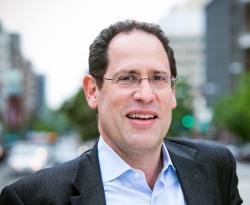Below is a viewpoint from Chapter 4 of the Foresight Africa 2017 report, which explores six overarching themes that provide opportunities for Africa to overcome its obstacles and spur inclusive growth. Read the full chapter on bolstering urbanization efforts here.
 In October of 2016, the third United Nations Conference on Housing and Sustainable Urban Development (Habitat III) reaffirmed the high stakes of ongoing urbanization in the developing world and set a new agenda for promoting sustainable and inclusive growth. It also made clear that achieving the goals set forth requires stronger sub-national leadership and capacity.
In October of 2016, the third United Nations Conference on Housing and Sustainable Urban Development (Habitat III) reaffirmed the high stakes of ongoing urbanization in the developing world and set a new agenda for promoting sustainable and inclusive growth. It also made clear that achieving the goals set forth requires stronger sub-national leadership and capacity.
Those stakes are especially high across Africa, which is forecast to urbanize at a rate of 3.65 percent annually, adding nearly 350 million new city-dwellers by 2030. The question for African cities as they expand in population and economic importance is twofold: How to grow in ways that are both sustainable and inclusive? And, what forms of governance can incentivize sustainable physical and economic growth while also housing the capacity to enable it?
These questions have grown more complex as city responsibilities have increased. Many of the most pressing economic and social challenges we face globally are distinctly urban: inequality and technological upheaval, environmental degradation and unsustainable development, energy and climate pressures, demographic change, migration, and social unrest. These dynamics require a problem-solving apparatus beyond the capabilities of national governments alone. Robust city and metropolitan governance can provide a solution.
Local governance itself is not without its own hurdles. Regional leaders must resist parochialism— understanding that collaboration with neighbors is imperative at a time when competition is global, not local. The limits of municipal capacity within government demand a broader conception of governance, one that includes the private and civic sectors as co-stewards of the metropolitan agenda. This type of networked, distributed governance can provide “checks and balances” on any central governing party, mitigating a third unfortunately prevalent threat: corruption.
Many of the distinct challenges facing rapidly growing African cities—from land rights, to infrastructure, to education and training—are best solved by local authorities.
Yet, despite these challenges, localism offers benefits beyond its cost. With “policy” at the regional level delivered by cross-disciplinary networks of actors—local government, but also private sector innovators, civic organizations, and research institutions—cities are more flexible and nimble than national governments, and thus more able to experiment and solve complex problems. Many of the distinct challenges facing rapidly growing African cities—from land rights, to infrastructure, to education and training—are best solved by local authorities. And by leveraging the full value of public assets within their borders, these cities can raise local sources of capital, reducing their reliance on transfers from national governments or international aid.
Once proven in one region, innovations in governance and policy must be spread—adapted and tailored for other areas and other cities. In some ways, rapidly developing cities in Africa, especially underdeveloped mid-sized urban centers, have the opportunity to avoid the mistakes of cities in the developed world and to invent a modern form of city-building and governance that can, in turn, inform progress underway in cities across the U.S. and Europe. Through this new circuitry of innovation, we have a chance to deliver on the goals of building better cities and better nations.
The Brookings Institution is committed to quality, independence, and impact.
We are supported by a diverse array of funders. In line with our values and policies, each Brookings publication represents the sole views of its author(s).







Commentary
Foresight Africa viewpoint: Why is strengthening cities in Africa important when considering political decisions and policymaking?
January 18, 2017